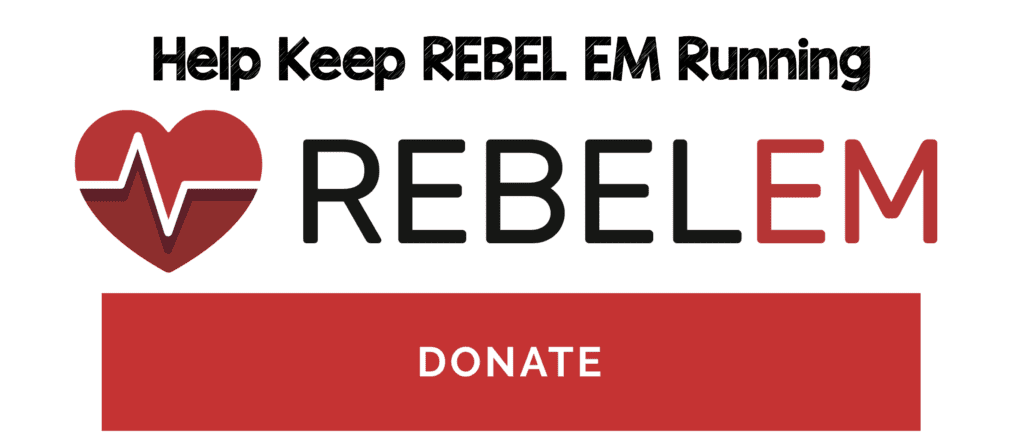
Paper: Deftereos SG et al. Effect of Colchicine vs Standard Care on Cardiac and Inflammatory Biomarkers and Clinical Outcomes in Patients Hospitalized with Coronavirus Disease 2019: The GRECCO-19 Randomized Clinical Trial. JAMA Net Open 2020. PMID: 32579195
Clinical Question: Is the use of colchicine among patients hospitalized with symptomatic COVID-19 associated with clinical benefit?
What They Did:
- Multicenter, prospective, open label, randomized clinical trial in 16 hospitals in Greece
- The GReek study in the Effects of Colchicine in Covid-19 cOmplications prevention (GRECCO-19)
- Patients randomized 1:1 to:
- Standard medical treatment (SMT) x 3 weeks
- SMT + colchicine 1.5mg loading dose followed by 0.5mg after 60min and maintenance doses of 0.5mg BID x 3 weeks
Outcomes:
- Primary:
- Maximum high-sensitivity cardiac troponin level
- Time for C-reactive protein to reach more than 3x the upper reference limit
- Time from baseline to clinical deterioration by 2 points on a 7-grade clinical scale (Ranging from able to resume normal activities to death)
- 1 = ambulatory, normal activities
- 2 = ambulatory, unable to resume normal activities
- 3 = hospitalized, not requiring supplemental oxygen
- 4 = hospitalized, requiring supplemental oxygen
- 5 = hospitalized, requiring HFNC, NIV, or both
- 6 = hospitalized, requiring ECMO or IMV
- 7 = death
- Secondary:
- Percentage of participants requiring mechanical ventilation
- All-cause mortality
- Number, type, severity, and seriousness of adverse events
Inclusion:
- Hospitalized adult patients with COVID-19
- Temp ≥37.5C
- 2 or more of the following:
- Sustained coughing
- Sustained sore throat
- Anosmia and/or ageusia
- Fatigue and/or tiredness
- Arterial PaO2 <95mmHg on room air
Exclusion:
- Pregnancy or lactation
- Known hypersensitivity to colchicine
- Known hepatic failure
- eGFR <20mL/min/1.73m2
- QTc ≥450ms (implemented due to concerns of a potential interaction between colchicine and HCQ)
- Clinical assessment indicating that ventilatory support would be inevitable in the following 24 hours due to rapid decline in respiratory status
Results:
- 105 patients randomized
- 60% of patients enrolled were in the class 4 category (hospitalized, requiring supplemental oxygen)
- Median Peak High-Sensitivity Cardiac Troponin Value:
- SMT: 0.0112 ng/mL (0.0043 to 0.0093)
- SMT + Colchicine: 0.008 ng/mL (0.004 to 0.0135)
- P = 0.34 (Not statistically significant)
- Maximum CRP Level:
- SMT: 4.5 mg/dL (1.4 to 8.9)
- SMT + Colchicine: 3.1 mg/dL (0.8 to 9.8)
- P = 0.73 (Not statistically significant)
- Rate of Clinical Deterioration by 2 Points:
- SMT: 14.0% (7 patients)
- SMT + Colchicine: 1.8% (1 patient)
- OR 0.11; 95% CI 0.01 to 0.96; p = 0.02
- Of the 7 patients in the SMT group 1needed BiPAP, 5 were intubated and on IMV, 3 died shortly after intubation, and 1 died of cardiac arrest
- D-Dimer concentration:
- SMT: 0.92ug/mL (0.68 to 2.77)
- SMT + Colchicine: 0.72 ug/mL (0.41 to 1.59)
- P = 0.04
- Adverse events similar between groups with the exception of diarrhea being more common with colchicine (45.5% vs 18.0%; p = 0.003)
- Discontinuation of medication was only required in 2 patients overall secondary to diarrhea
Strengths:
- Multicenter, prospective, randomized clinical trial
- 1st randomized trial investigating colchicine use for COVID-19
- Asks a clinically important question of whether a cheap, readily available drug can have an impact on COVID-19
- Groups were well balanced in terms of demographic characteristics, clinical status at presentation and baseline laboratory evaluation
- No patients were lost to follow up
Limitations:
- 30% reduction in the biochemical end points is also rather large and not realistic. Again, a larger trial would be needed to achieve a smaller reduction in these endpoints
- Small study when there were lots of patients (this is a particular concern as there may have been some selection bias)
- Patients were not consecutively recruited which may also result in selection bias
- Patients in the colchicine group were enrolled a bit faster than the control group (3d vs 5d). As this was an open-label trial, it has to make one wonder if patients receiving colchicine received a better level of care which could bias the results (i.e. open-label study)
- Open-label trial with the decisions to escalate care being subjective.Open-label adds bias particularly since not an objective endpoint
- Patients in the SMT group had more comorbid disease (i.e. HTN, DM, dyslipidemia) all of which would bias results to favor colchicine
- Small number of clinical events limits the statistical robustness of the results
- Study not powered to detect differences in rare adverse events
- 3 primary outcomes were studied when there should only be 1. 2 of the 3 primary outcomes were negative
- If colchicine exerts effect by reducing inflammation, would expect markers to reflect this as well
- Due to the fact that the study has a small number of enrolled patients, the confidence interval are very wide making it difficult to know the true benefit of colchicine
- Study is too small to give us useful information about safety
Discussion:
- Patient recruitment started on April 3rd, 2020 and terminated on April 27th, 2020 because of slow enrollment as a result of rapid flattening of the curve of COVID-19 cases in Greece
- Most patients were receiving concomitant chloroquine or hydroxychloroquine (98.1%) and azithromycin (92.4%). Neither of these meds are consider standard treatment for COVID19 at this time
- Only 50% of admitted patients were on anticoagulation.All patients admitted to the hospital, unless high-risk of bleeding, should be anticoagulated
- Initiation of colchicine after mechanical ventilation needs to be studied separately as the patients enrolled in this trial were patients hospitalized before requiring ventilatory support
- Interestingly, authors dropped CRP as a primary outcome (check clinical trials.gov) but, reported it as one in the manuscript
- The primary endpoint was time to deterioration by 2 points, but they report it as how many patients deteriorated.There is no explanation of this change in reporting
- Colchicine toxicity is typically delayed up to 12 hours after ingestion.IT can start with abdominal pain nausea/vomiting, and diarrhea. After 1 to 7 days toxicity can include confusion, cardiac, renal, and hepatic impairment in addition to respiratory distress, hyperpyrexia, and bone marrow suppression. There is no specific antidote for colchicine toxicity
Author Conclusion: “In this randomized clinical trial, participants who received colchicine had statistically significantly improved time to clinical deterioration. There were no significant differences in high-sensitivity cardiac troponin or C-reactive protein levels. These findings should be interpreted with caution.”
Clinical Take Home Point: Although the observed clinical difference in decrease in clinical deterioration with the addition of colchicine to standard medical therapy is impressive, these results should be considered hypothesis generating due to the size of the trial and the issues in the methodology These results would need to be replicated in a larger trial, with more clinical events before implementing the use of colchicine into clinical treatment of COVID-19.
References:
- Deftereos SG et al. Effect of Colchicine vs Standard Care on Cardiac and Inflammatory Biomarkers and Clinical Outcomes in Patients Hospitalized with Coronavirus Disease 2019: The GRECCO-19 Randomized Clinical Trial. JAMA Netw Open 2020. PMID: 32579195
For More Thoughts on This Topic Checkout:
- The Bottom Line: GRECCO-19
Post Peer Reviewed By: Anand Swaminathan, MD (Twitter: @EMSwami)





